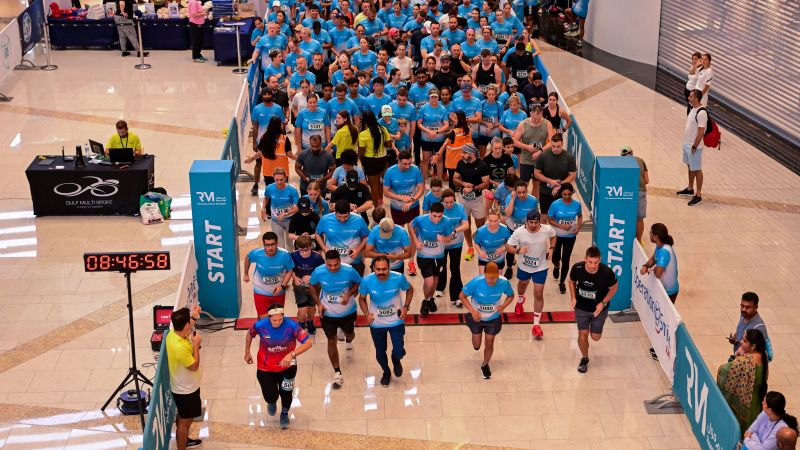EDITOR’S NOTE: This CNN Travel series is, or was, sponsored by the country it highlights. CNN retains full editorial control over subject matter, reporting and frequency of the articles and videos within the sponsorship, in compliance with our policy.
Summer in the United Arab Emirates (UAE) is not for the faint-hearted. The mercury rises beyond 40 degrees Celsius, or 104 Fahrenheit, and the bright sun dazzles down on environments that have little in the way of natural shelter.
Traditionally, the UAE has embraced outdoor sports and large-scale fitness events, from desert marathons to beachfront yoga sessions. But during the peak summer months, these activities become not only uncomfortable but potentially dangerous.
This has inspired new ways for residents and tourists to beat the heat, with innovations including indoor ski slopes and theme parks. It even led to the first indoor mall runs, launched in 2017 by Gulf Multi Sport, a sports event company based in Abu Dhabi.
Steve Watson, founder and managing partner of Gulf Multi Sport, says that the mall run concept emerged out of necessity. “We wanted to give people a chance to maintain their fitness through the oppressively hot summer months,” he told CNN.

The UAE’s mall culture makes the idea uniquely suited to the region. Unlike smaller malls elsewhere, Abu Dhabi’s shopping centers are vast, multi-level spaces connected by escalators and wide walkways.
For instance, Yas Mall, the city’s largest, spreads across 2.5 million square feet (230,000 square meters).
This offers runners a variety of loops and courses that can accommodate different distances while avoiding overcrowding and ensuring safety. According to Watson, runners usually start in staggered groups using chip timing instead of mass starts.
Since 2017, the company has hosted mall running events at venues like Yas Mall, Reem Mall, or Ferrari World, a theme park on Yas Island that doubles as a race venue.
The Reem Mall Run Series, for example, features four races held monthly from June to September. Runners can sign up for individual events or compete across the series to earn points and a shot at being crowned Reem Mall’s Champion runner. Each race offers 2.5-kilometer (1.5-mile), five-kilometer (three-mile), and 10-kilometer (six-mile) distances, with the option to participate virtually if traveling.
Initially, the events were driven largely by expatriates, but today there is strong participation from UAE nationals, which Watson highlighted as a rewarding shift. He said that families, women and runners of all ages and fitness levels join the races, many supporting various charitable causes tied to the events, such as cancer awareness and environmental sustainability.
“Our ladies-only events at Ferrari World attract over a thousand runners, many Emirati women who value the supportive, private setting. It’s become a community tradition, with dads running alongside daughters and groups of friends supporting each other,” said Watson.
Martin Corrado, who is in his late seventies and often runs alongside his wife, Mary, is typically one of the older participants on the course.
“Running inside a mall is climate-controlled, surfaces are even and good, with marshals to guide us. Mall runs are becoming more popular and attracting all ages. To be able to continue running throughout the year is the most enjoyable feature,” he said.
Mall runs are not the only option for staying active in Abu Dhabi throughout the summer. For those still craving the outside air, Marsana Night Beach opened this year on Hudayriyat Island, a leisure and sports hub close to the city center. The after-dark swimming spot offers a refreshing way to cool off once the heat of the day fades.
This is not a new concept for the UAE — Dubai has previously opened its Jumeirah beaches at night, but it is the first time the experience has come to Abu Dhabi.
Even at night the sand remains hot underfoot and the still waters of the Persian Gulf, the planet’s hottest sea, are bathtub-warm. Beachgoers can recline on beds under parasols, even though there’s no sun to shade from.
“It used to be much harder to find outdoor activities here and, for sure, in summer it’s mostly an indoors life, but we really love having this new option and it’s only a short drive from our home,” said George Khoury, an Abu Dhabi resident originally from Lebanon.

The sun goes down shortly after 7 p.m. in July in Abu Dhabi, and about an hour earlier by the time the end of September rolls around, which is when the night beach sessions will come to a close. As soon as the light fades, floodlights turn on, with the venue open to 10 p.m. Monday to Thursday and until midnight Friday to Sunday.
The beach gives residents and tourists alike a chance to experience nature during the summer, which is usually off limits, said Abdulazeez Manea, an Emirati working in the tourism industry in Abu Dhabi. “The sand here is too hot to walk on in the day, so opening at night is a much more suitable idea … We can enjoy sitting together outside in a more relaxed and peaceful environment and still be able to walk barefoot and have the benefits of the beach that we love.”
Crucially, it also brings in more economic opportunity for the area, increasing footfall to nearby restaurants and shops, said Abdulla Yousuf, director of international operations at Abu Dhabi’s Department of Culture and Tourism.
“By enabling safe and convenient beach access after dark, we are enhancing quality of life for the community, while also expanding the emirate’s appeal as a summer tourism destination,” he told CNN.

